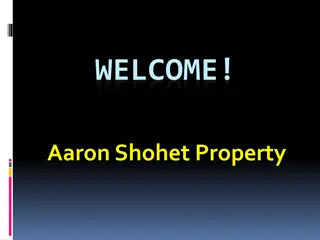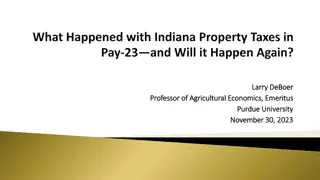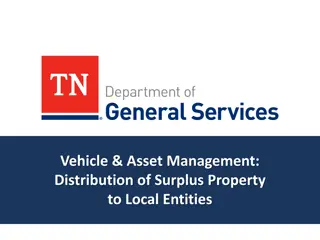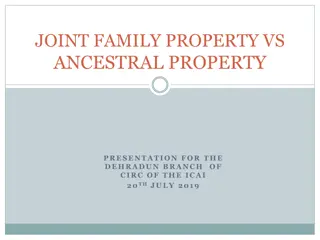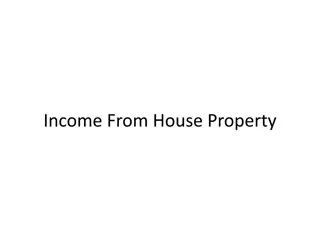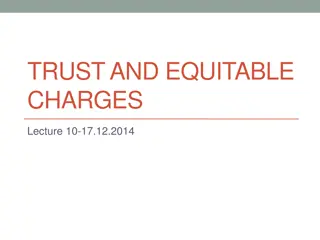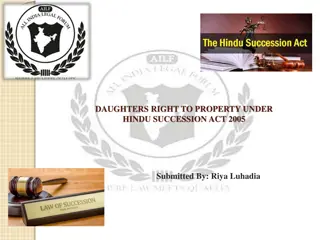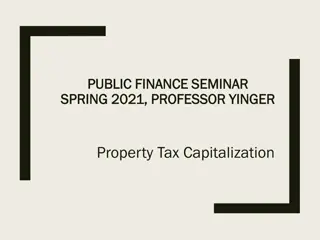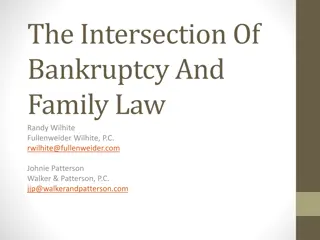Understanding the Law of Property: Concepts and Rights
This material explores the fundamental concepts of the Law of Property, covering topics such as the concept of patrimony, property rights, and the objects of property. It delves into the origins and legal implications of patrimonial and extra-patrimonial rights, shedding light on the significance of property in legal frameworks. The discussion also touches upon how property rights are exercised and the relationship between property and individual personality.
Download Presentation

Please find below an Image/Link to download the presentation.
The content on the website is provided AS IS for your information and personal use only. It may not be sold, licensed, or shared on other websites without obtaining consent from the author. Download presentation by click this link. If you encounter any issues during the download, it is possible that the publisher has removed the file from their server.
E N D
Presentation Transcript
SIMAD UNIVERSITY Faculty of law Course name: Law of Property Prepared by: Mohamed-wali Isse Ahmed Lecturer in Law February, 2016
Introduction to Law of Property This Chapter covers the following topics: a. Concept of Patrimony b. Concept of Property c. Concept of Law of property d. Theories of Property e. Objects of Property f. Classification of Objects of Property Saturday, October 5, 2024
Concept of Patrimony Rights regulated by Civil law are divided into two main parts: Patrimonial rights which are rights with financial value and they may originate from contract, Tort or rights on property. Extra-patrimonial rights which are rights which can t be assessed in financial value. Saturday, October 5, 2024
Extra patrimonial rights may originate from Family law and others. So, what does patrimony mean? Patrimony means total rights and obligations of a person which have financial value or can be assessed in terms of money. In law of property, it can be defined as the totality of property rights of a person. Saturday, October 5, 2024
some legal scholars claim that patrimony emanates from the personality of the person and it can be characterized the following: Every patrimony presupposes a person who is its holder; Every person has a patrimony; A person can have only one patrimony; and Patrimony is inseparable from the person of its holder. Saturday, October 5, 2024
concept of property In ordinary English, property means two things which are: - ownership - owned things which may have material or moral value In its legal term, it refers to the rights of a person may have in relation to things that have economic value. Saturday, October 5, 2024
The things or objects in relation to which property rights are exercised are called objects of property such as land, car and any other thing that can be owned under the law. Property rights are the right to use, enjoy, transfer, exclude others and abandon. Saturday, October 5, 2024
Concept of Law of Property Law of property is defined in many different ways which all need to be scrutinized and examined. let us see the following definitions: a. Law of Property may be defined as a branch of private law regulating relations between persons with respect to things or objects. Saturday, October 5, 2024
b. Law of Property is that branch of law which specifies the objects or things in relation to which property rights may be exercised and their classification, the types of rights which are considered as property, how property rights are acquired, transferred, extinguished, the specific rights and obligations of the property right holder, the obligations of other persons towards the owner is known as property law. Saturday, October 5, 2024
Scope of Law of Property Law of Property does not regulate everything that relates to objects of property because objects of property may become subject to other law such as Law of contract or law of tort. Law of property regulates objects of property as a property rights that owner exercises on the object. Saturday, October 5, 2024
Theories of property Theories of property try to explain the following: Origins of private property This theory tries to explain how private property came into existence when all property were held in common. Justification or condemnation of private property. This theory attempts to justify or condemn the institution of private property. Saturday, October 5, 2024
Theories on origins of private property The following theories attempts to explain the origin of private property: a) Positivist Theory b) The Hegelian Theory c) The Occupation Theory d) Labor Theory. Saturday, October 5, 2024
Positivist Theory Pursuant to Positivist Theory Law is the command of the Sovereign. These laws promote general welfare of the Society and maximize social utility. property and law born together and die together. Property is the basis of expectation of deriving certain advantages from a thing which we are said to possess, in consequence of the relation in which we stand to wards it and this expectation can only be the work of the law. Saturday, October 5, 2024
The main critics that this theory faced is that law and property are the result of social forces and can t be say that one is the creation of another. John Locke s Social Contract theory claims that state is created by Social contract in exchange of protection of their rights including their property rights. Saturday, October 5, 2024
The Hegelian Theory According to George Wilhelm Friedrich Hegel, a human person is merely an abstract unit of free will or autonomy that does not have a concrete existence until that will acts on the external word. Hegel concludes that the person becomes a real self only by engaging in a property relationship with something external. Such a relationship is the goal of the person. Saturday, October 5, 2024
Hence, private property originated in the person s attempt to actualize his/her free will when someone extends his will to external things he makes that thing a part of himself. Professor Margaret Jane Radin claims that a person to achieve self-development; he needs to exercise control on resources in the external environment where it takes the form of property rights. Saturday, October 5, 2024
The Occupation Theory In the beginning of the world The Creator gave to man dominion over all the earth and over the fish of the sea and over the fowl of the air and over every living thing that moves up on the earth. This is the only solid foundation of man s dominion over external things. in the earliest, there were not a permanent possession of property because the right of possession continued only for the time only the act of possession lasted. Saturday, October 5, 2024
occupancy gave the right to the temporary use of the soil. So it is agreed up on all hands, that occupancy also gave to the original right to the permanent property in the substance of the earth itself, which excludes every one else but the owner from the use of it. Property, both in lands and movables, being thus originally acquired by the first taker, which taking amounts to declaration that he intends to appropriate the thing to his own use, it remains in him, by the principle of naturals law, till such time as he does some other act which shows his intention to abandon Saturday, October 5, 2024
it; for then it becomes, naturally speaking, publici juris once more, and is liable to be appropriated by the next occupant. some argued that the idea of first occupier becomes the owner of thing is based on implied consent of the community while other argued that it s a natural justice that the first occupier to become the owner of thing because he added his labor into it. In the late 17th century, Samuel von Pufendorf refined a theory of the origins of property rights that had been in existence since ancient times. Saturday, October 5, 2024
Property, he said, is founded in the physical power manifested in seizing the object of property . In order, however, to convert the fact of physical power into a right, the sanction of the state is necessary. However, the state cannot make a property right where physical possession is not present. Thus, both occupation and state sanction are necessary conditions for legitimacy of property. Saturday, October 5, 2024
Labor Theory John Locke argues that natural reason tells us that men, being once born, have a right to their preservation, and consequently to food, drink, and such other things nature affords for their subsistence and for realization of that, the creator gave the world human kind in common. Though the earth and all the creatures are common to all men, every man has a property in his own person to which nobody has any right to but himself. The labor of his body and the work of his hands, we may say, are properly his. Saturday, October 5, 2024
So where a person appropriates a land or any one of its fruits, he has mixed his labor with, and joined to it, such thing is his own and there by makes it his property. This is because he has removed it from the common state of nature and has placed it in to some thing which is exclusively his own. The difference between things owned privately and those, which are commonly owned by all human kind, lies in the fact that ones labor has been added to on. Saturday, October 5, 2024
This theory has certain problems which are: a. In the absence of prior theory of ownership, it is not self evident that one owns even his/her own labor that is mixed with something. b. The labor theory does not provide guidance in determining the scope of the right that one establishes by mixing one s labor with something else. Saturday, October 5, 2024
Theories regarding the justification of private property The theories discussed above in connection with the origin of private property are also used to justify or condemn the existence of the institution. a. Occupation Occupation theory tries to justify the existence of private property on the ground that the first occupier should be rewarded and property acquired in such a manner is ethically justifiable to become the owner of that piece of property. Saturday, October 5, 2024
b. Labor Theory Labor theory -private property is the result of individual labor because industry (hard work) should be encouraged by granting to a worker the ownership of the res, which is created by his labor so that even greater productivity is achieved. c. The Utilitarian theory the function of the legislator/ state is to maximize the sum of human happiness, and private property, which is the expectation of protection provided by the state, is justifiable because it increases human happiness. Saturday, October 5, 2024
d. Hegelian Theory- Property is a part of the personality of the owner and the protections provided for property of the person are protections for the person. This, thus, the existence of the person and hence his/her property is just. e. Marxist Theory- According to the communists, the history of all societies in the world is the history of class struggles between the slaves and freemen, feudal lords and serfs or vassals, the bourgeoisie and the proletariat. Saturday, October 5, 2024
These struggles are always between those who control the means of production and those who do not and hence the letter have to depend on the former for their livelihoods by selling their labor. These relations were not always based on equal or even fair exchange of labor and wages or other form of payments. In effect private property served and is serving as a means of exploitation of the slave and hence it has to be abolished for being an evil tool. Saturday, October 5, 2024
Objects of Property In common, a thing to be considered as an object of property has to have the following: - permanence ; and - physical unity Objects of property is defined as the goods or things over which a right of property may be exercised. Saturday, October 5, 2024
Classification of objects of property The purpose of classification of objects of property are: a. Economic and social value attached with objects. Rules that govern the objects are different. b. It helps judges, lawyers, legislators and students who study law to enact rules governing the particular objects when dispute arise. Saturday, October 5, 2024
The following are the classification of objects of property: a. Corporeal and incorporeal This classification is based on the physical or material nature of things or objects. it is a classification of things into those that can be perceived by the senses and those which cannot be so perceived. Corporeal things are things that have material or physical existence and unity and hence, can occupy space and can be seen or touched. Hence, things such as a house, a car, an ox, and a watch are corporeal things. Saturday, October 5, 2024
Incorporeal things are things that do not have a material or physical existence, that cannot occupy space and hence that cannot be perceived by the senses. B. Movable and immovable things The modern distinction is between movable and immovable things. The basis of this classification is physical mobility or immobility and the value or importance attached to various types of property. Saturday, October 5, 2024
Movable things Movable things are things which can move by themselves or be moved by man without losing their individual character. Hence, an ox, a car, table, a book are movable because they can move by themselves or be moved by man from place to place with out being dismembered in to several parts. Special movable things These are movable things by nature but to which the law attaches characteristics of immovable things. The law does so mainly because of the importance attached to these types of things. Saturday, October 5, 2024
The rules governing the acquisition, transfer and proof of rights over ordinary movable things shall not apply to special movable things, because they are governed by the rules applicable to immovable. This classification includes things such as motor vehicles, ships, airplanes, televisions and businesses. Saturday, October 5, 2024
Movables by anticipation These are immovable things by nature but which the law considers as movable things. Trees and crops which are considered as intrinsic elements of land will be considered as distinct movable things where they are the subject to contracts for their separation. Saturday, October 5, 2024
Immovable Things Immovable things are things that cannot be moved from one place to another at all or that cannot be moved without being divided in to several parts. Immovable things are divided into the following: - Immovable by nature; and - Immovable by destination Saturday, October 5, 2024
Immovable by Nature Land refers to a space as much as it refers to the material of which that part of the land is made. In its spatial aspect, land is immovable, while in its material aspect it may be removed, at least partially, by removing the soil. A house attached to land is an immovable in law, but obviously, it may be moved in fact by demolishing. Saturday, October 5, 2024
The following are special characters of land that distinguishes it from other properties. 1. Land is more enduring than other properties; hence, future interests in land have definite value. 2. It is important for purposes of security because of the fact that land cannot be moved and it is permanent as opposed to furniture or vehicles that may be easily hidden. 3. A risk of destruction of the land, for example, by storm or fire is minimal. 4. Land can be subdivided with out necessarily losing its value. Saturday, October 5, 2024
5. Land is still very necessary for expansion of industries, large farms and creation of means of transport. Immovable by destination Immovable by destination are movable things that are placed permanently with an immovable thing for the latter's economic exploitation. In other words, these are movable things by their nature but which the law considers as immovable things because they are placed or attached to a land for its economic exploitation. Saturday, October 5, 2024
Real and personal property Real rights/ rights in-rem/ refer to either a power to recover a specific thing, or more often a right that may be exercised against any person, while personal rights or /rights in-personam/ are rights that may be exercised against a particular person. Saturday, October 5, 2024
Fungible and non-fungible things Fungible things consist of movable things that, in ordinary dealings, are usually determined by number, measurement or weight and hence any unit is, from its nature or by mercantile usage, treated as the equivalent of any other unit. Non-fungible things, on the other hand, are movable or immovable things, which in ordinary dealings, are determined by their specific identity. Saturday, October 5, 2024
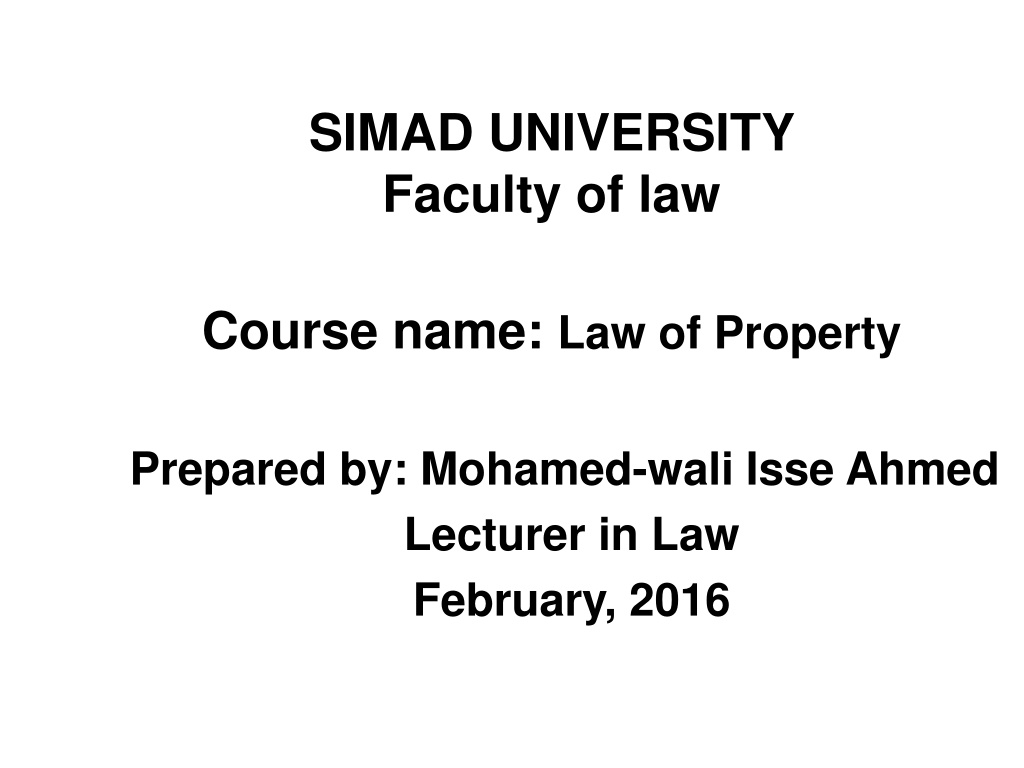


![Property Settlements in Family Law: Case Study of Stamatou & Stamatou [2022] FedCFamC1F 241](/thumb/63303/property-settlements-in-family-law-case-study-of-stamatou-stamatou-2022-fedcfamc1f-241.jpg)
